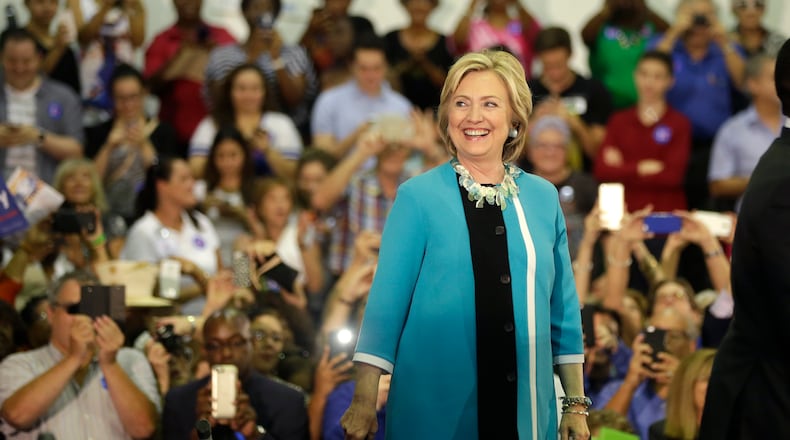Democratic presidential front-runner Hillary Clinton backed new criminal justice reform policies in Atlanta on Friday as she tries to leverage her advantage with minority voters over Vermont U.S. Sen. Bernie Sanders.
Clinton endorsed legislation that would ban racial profiling by law enforcement, vowed to sign an executive order that would ban federal employers for asking job-seekers about their prior criminal convictions and pushed to eliminate the distinction between crack and powder cocaine in drug sentencing.
They are part of a broader package that Clinton's campaign plans to unveil over the next few days.
She also rolled out the "African Americans for Hillary" group at Clark Atlanta University after a luncheon with black ministers headlined by the Rev. Jesse Jackson. It's her first public campaign appearance in Atlanta this year, although she has visited for private fundraisers.
"We have to take on the continuing abuses where oppression is more prevalent than opportunity," said Clinton, adding: "We have to create those channels of opportunity so that we go from childhood to adulthood pursuing your dreams, instead of cradle to prison and seeing them die."
Her proposal would prohibit any law enforcement officer from relying on race when making routine stops or a "spontaneous investigative activity" unless there's information linking the person to a crime, according to a campaign aide.
She will also seek to end disparities in sentencing for people caught with powder cocaine and crack. President Barack Obama signed a law in 2010 that helped bring down a 100-to-1 sentencing disparity to 18-to-1, but those convicted of using crack still face far steeper penalties.
Clinton will vow to make them even by increasing the threshold for crack offenses so it meets the powder cocaine guidelines. A campaign aide said treating both forms of the same drug differently "disproportionately hurts black Americans," who tend to use the drug more commonly than others.
And she said she will sign an order to "ban the box," a move preventing government agencies as well as contractors from asking about a job-seekers criminal history at the initial application stage. Clinton said the measure, which Deal enacted in Georgia earlier this year, would give convicted criminals a better chance to compete for a job.
Sanders, her closest Democratic competitor, this week proposed allowing states to decriminalize marijuana by removing it from a federal list of the most dangerous outlawed drugs, giving states more leeway to legalize and regulate it.
He said in a statement Friday that he agreed with Clinton's initiatives, but added that any "serious criminal justice reform" should also include giving states more leeway to regulate and legalize marijuana.
"When we talk about criminal justice reform, we also need to understand that millions of people have been arrested for using marijuana," he said. "We must recognize that blacks are four times more likely than whites to get arrested for marijuana possession, even though the same proportion of blacks and whites use marijuana."
Former Maryland Gov. Martin O'Malley, another Democratic presidential candidate, has also outlined what his campaign bills an "ambitious" plan for criminal justice reform that includes abolishing the death penalty and ending mandatory minimum sentencing guidelines.
Republicans called Clinton, who voted for tough-on-crime proposals in the U.S. Senate, as a hypocrite. Republican National Committee spokesman Orlando Watson said she lobbied for the "same policies she is now blaming for mass incarceration."
"Hillary will say anything to get elected, which is why the majority of Americans continue to find her to be dishonest and untrustworthy," he added.
Clinton has flexed her muscle in Georgia. She recently announced a list of about 60 Georgia supporters, headed by Rep. John Lewis, D-Atlanta, showing her stranglehold on the Georgia Democratic establishment.
Southern states with high African-American populations have been seen as a possible firewall for Clinton, and Georgia’s March 1 “SEC Primary” could help shape the race.
This time around, she's relying on her popularity with black voters, who make up the bulk of the Democratic primary electorate in most Southern states. The Clintons have a deep well of support in the African-American community, and a CNN poll this month gave her a 50-point lead over Sanders in the critical early-voting state of South Carolina.
To press her advantage even more, she's announcing a new group — African Americans for Hillary — at her Friday event at Clark Atlanta University. Atlanta Mayor Kasim Reed, one of Clinton's most high-profile supporters in Georgia, said Sanders' struggle to gain support among minority leaders boils down rather simply.
"The Clintons have got a long-standing relationship with the black community and it's going to pay off," he said. "And candidly, Senator Sanders is a good, bright and able man — but he doesn't have that relationship."
About the Author
The Latest
Featured




